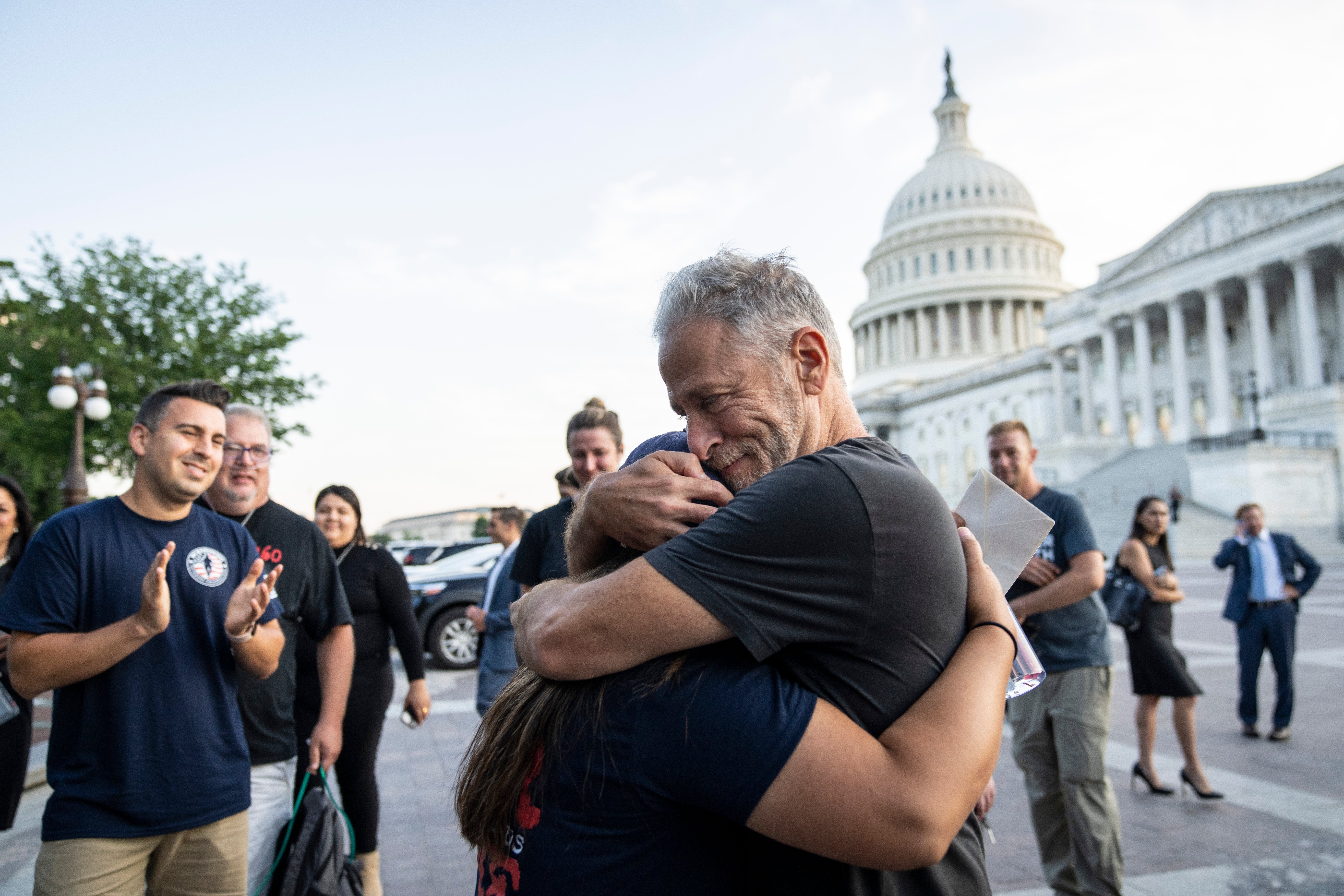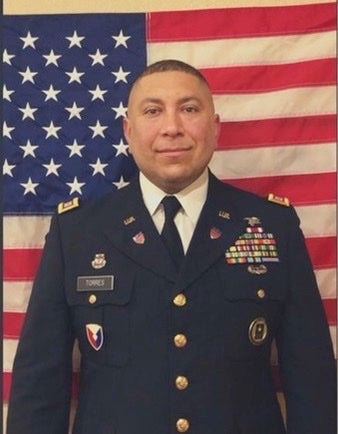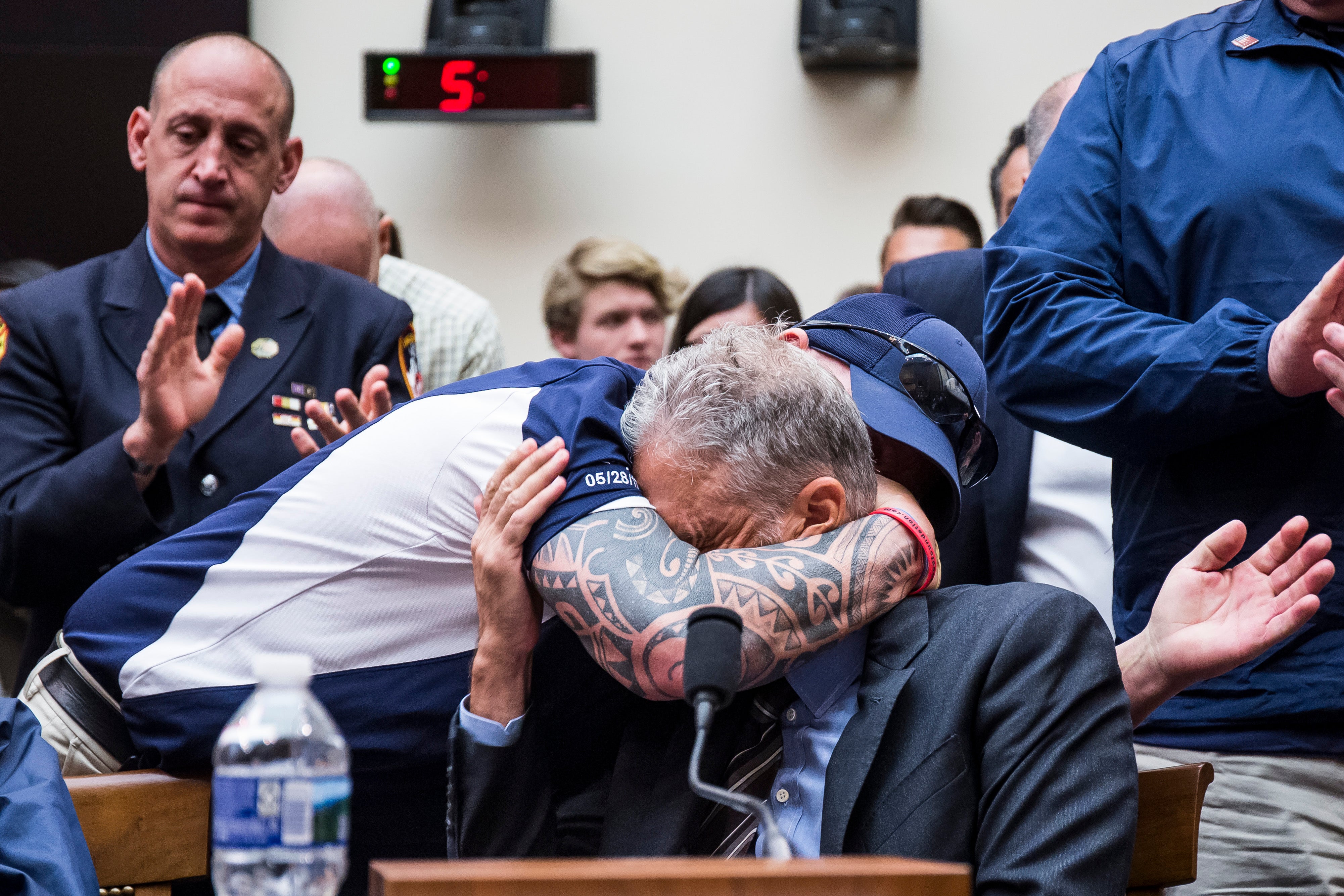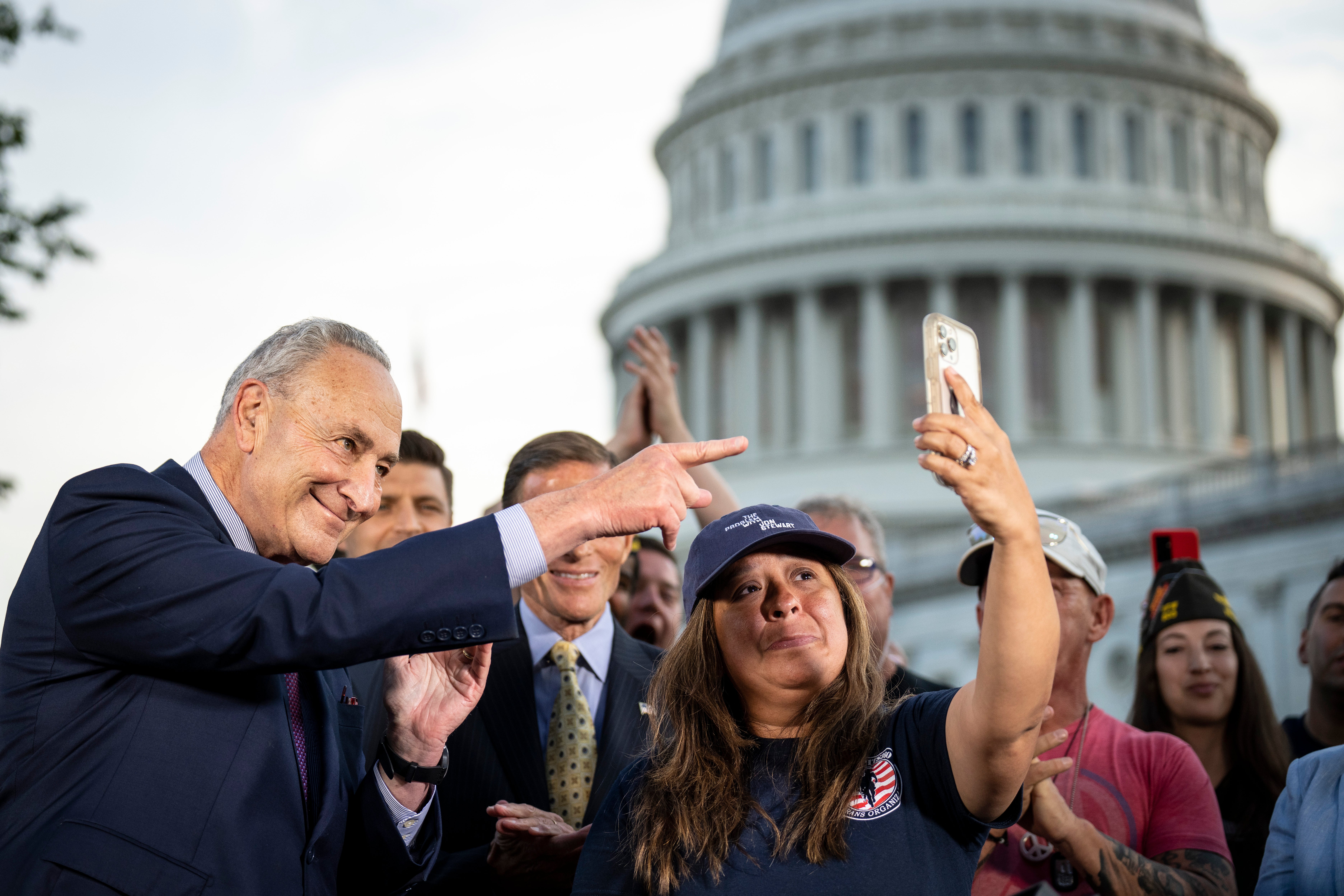It’s been two years since Biden signed the burn pits bill into law. But sick veterans say the fight isn’t over
A major milestone has now been reached with one million claims approved by the VA, giving veterans access to healthcare after burn pits exposure made them sick. Veterans and advocates tell Gustaf Kilander about the years of ‘gaslighting’ before they got to this point– and what needs to happen next


“The PACT Act didn’t just miraculously heal everyone. So there’s work to do,” Rosie Torres tells The Independent.
It’s now almost two years on from when President Joe Biden signed the PACT Act – the Sergeant First Class Heath Robinson Honoring our Promise to Address Comprehensive Toxics Act of 2022 – into law in August 2022.
And a major milestone has now been reached.
On Tuesday, the president announced that more than one million claims had been approved by the VA, giving more than 880,000 veterans and survivors access to much-needed healthcare and disability benefits.
“That matters because too many servicemembers” have been “breathing in toxic fumes” from burn pits, Mr Biden said in remarks from Nashua, New Hampshire.
Mr Biden described the pits as large as football fields, ten feet in depth and used for incinerating “all the wastes of war,” burning “everything from tires, to chemicals to jet fuel and so much more.”
From the pits, smoke would emanate, “thick with poison, spreading through the air and in the lungs of many thousands of troops who lived [and] worked near them.”
The president is convinced that exposure to burn pits in Iraq caused the brain cancer that killed his son Beau Biden in 2015.
“I pushed the PACT Act — so today’s veterans don’t suffer the same painful, frustrating delays and denials,” he said on Tuesday.

Like Beau Biden, thousands of US service members returned home from war sick and dying from rare cancers, respiratory conditions and other illnesses caused by their exposure to the toxins.
And for years, they fought in vain to get access to VA healthcare.
A long fight
For Rosie and her husband Le Roy Torres, it was – and continues to be – a long fight
Mr Torres returned home from a tour of Iraq and began suffering respiratory difficulties.
He underwent hundreds of medical visits and was medically retired from the Army following 23 years of service after eventually being diagnosed with a rare lung disease and toxic brain injury.
As they struggled through delays, benefits denials, and inadequate treatment, they launched the organization BurnPits360 in 2010 to advocate for other veterans with diseases stemming from burn pits exposure.
For over a decade, they fought for the passage of legislation.
“It was a lot of gaslighting. It was a lot of maybe you have anxiety, this is a [mental health condition], you know, both from DOD and VA,” Ms Torres tells The Independent.
“It’s not okay that you go and serve your country and then you’re painted out to be as if you’re going to defraud the country you just finished defending,” she adds.
In a statement, Danielle Robinson, the widow of Heath Robinson, told The Independent: “We are grateful Heath's memory can live on through helping his fellow brothers and sisters with receiving healthcare they deserve. We hope many Veterans will have an easier process with the VA and their claims will get approved.”
Dr Julie Tomaska, a retired US Air Force veteran who works with BurnPits360, has also been diagnosed with constrictive bronchiolitis – a rare lung disease caused by burn pits exposure.
“I deployed in 2005 and 2007 and started getting sick shortly thereafter. And it took me ... about 13 years to really get a definitive diagnosis,” she tells The Independent on Tuesday.
“I still have metal that they found in my lung tissue. There was still soot on my lungs. And my biopsy was 11 years after I deployed.”

Before the passage of the PACT Act, even with a biopsy, her claim was denied. She had to get an attorney and appeal the decision before it finally went through – a process that took roughly three years.
“My background is in public health and epidemiology. And so I feel like I have a pretty good understanding of just health in general,” she says. “I also worked at the VA in clinical research for 10 years. So I have a fairly solid understanding of that system. And it still was really, really hard for me to navigate. So, imagine what that’s like for another veteran [who] doesn’t have the same background or tools to move forward.”
While a civilian pulmonologist was the “only one” who was willing to admit that something was wrong and try to establish a diagnosis, at the VA, her experience was rather different.
“They were telling me it was more in my head and just kind of that it was anxiety or PTSD,” she says.
Ground Zero
The fight for compensation and care for those exposed to toxins actually goes right back to the 9/11 terrorist attacks and the first responders who breathed in the toxic air at Ground Zero as they worked to save lives.
John Feal was a demolition supervisor at Ground Zero and has witnessed the deaths of many of his fellow 9/11 survivors in the years since the atrocity.
“I got hurt before everybody got sick,” he tells The Independent on Tuesday. “And while I have minor illnesses from the toxins, I’ve been to 212 funerals.”
“It’s not a coincidence that the men and women in uniform and non-uniform got sick from the toxic exposure at Ground Zero. For years, we walked the halls of Congress saying we were sick and dying. And we no longer had to prove that 9/11 made us sick, they had to prove that 9/11 didn’t make us sick.”
Mr Feal together with comedian Jon Stewart lobbied Congress – successfully – to pass the 9/11 compensation fund.
Then, they turned their attention to replicating this in passing the PACT Act for the veteran community
In a decade and a half, Mr Feal says he saw Mr Stewart “come out of character twice” – one of them being as they fought for the bill’s passage.
“I’ve seen John cry before. But this time he cried out of anger,” he recalls. “And there were a couple of times when I had to pull him aside in the hallway by ourselves and say, ‘You can’t do that in front of everybody. You’re too important, you too valuable. The veteran community is relying on you and you’re carrying basically three million people on your back. Don’t ever do that again’.”

“And he accepted,” he adds.
A step forward
Ms Torres, Mr Feal and Dr Tomaska all say the passage of the PACT Act and the milestone reached by the Biden administration is a massive step forward – but that the work is far from over.
“People are getting treated for illnesses that they would never have been treated for before. People are being taken seriously for illnesses that doctors at the VA didn’t believe they had,” Mr Feal says.
“This is now forcing people to do their job and do their job the right way and treat these men and women who serve us 24/7 around the world with dignity and respect.
“There are some special people in this world that can put aside their political and religious differences and just do what’s morally right. And there are people like John Stewart and Rosie Torres who deserve all the credit.”
“We walked the halls for almost two decades,” Ms Torres says of her congressional advocacy. “That was exhausting. And I saw many families tap out where they lost trust in our government.”
So far, more than 888,000 veterans and survivors have received benefits and healthcare through the PACT Act, according to the White House.
“That’s not a statistic. It’s a testament to all of these men and women who were begging for help before the PACT Act. So it’s monumental,” Ms Torres adds.
“It’s a testament of hope and support from the president. And we’re grateful that he understood it as a father, not as a president,” she says.
‘It’s personal’
But while the PACT Act is now helping hundreds of thousands of veterans and service members, there’s still work to be done.
Mr Feal says that bills are still in their infancy until they reach the five to 20 year threshold.
“You have to watch them and you have to advocate for them. And you have to have somebody on the wall 24/7. And you know, Rosie Torres at BurnPits360 is doing that,” he says.
For the Torres’, “it’s personal”. To this day, Mr Torres has undergone 460 medical visits and 27 CT scans as he continues to battle his health conditions.

“As the organization that led the PACT back into passage, it’s personal right to us,” Ms Torres tells The Independent.
“That’s why we fought so hard for 13 years, 20 years for some of the doctors that are on our team.”
She adds: “We’re spreading awareness on the lung disease that still plagues his body … it’s still gut wrenching as much as it was when he got back. We’re like, there’s no answers. There’s no cure. And so is this personal to us as it is to the president, with his son, losing his son to brain cancer that is seen in our registry of so many people self-reporting, that they’re suffering from that?
“So yeah, I mean, it’s, it’s still heartache for me, you know, as much as it is for our children and my husband.”
Work to be done
Ms Torres says that “we still have to rectify the injustice” that veterans suffering from cancers and lung disease still need better care.
“It’s not all about compensation, the PACT Act didn’t just miraculously heal everyone. So there’s work to do,” she adds.
Dr Tomaska calls the passage of the PACT Act and its implementation “a huge positive” but asks: “But is it enough? I would like to know how many were denied. And I would like to know why.”
More than a million PACT Act claims have been approved and the VA has processed 1,327,228 claims since 10 August 2022. But, 4.17 million claims, including 1,655,810 claims specifically connected to the PACT Act, have been made since August 2022, according to the White House.
This means thousands have been rejected.
Dr Tomaska explains: “A big reason on why claims are denied is just a basic volume and training issue. I think that the VA is having a really hard time keeping up with the volumes of claims coming in. And I think that they’re having a hard time properly training their staff on how to process PACT Act claims at a local level because if they were processing them appropriately, we wouldn’t be seeing people be turned away for presumptive conditions.”
Presumptive conditions mean that if someone was in Iraq and they develop lung disease, officials have to presume that it’s due to the individual’s service and must approve the claim, Dr Tomaska notes. The VA currently has a list of 23 presumptive diseases – but more care is needed for these conditions and there’s also many more conditions that to be added.
“The important next step would be getting the proper code for constrictive bronchiolitis,” Dr Tomaska says of her disease.
She adds: “Another step … would be working on provider education. There are so many VA providers ... that just are unaware of what toxic exposure is.”
Join our commenting forum
Join thought-provoking conversations, follow other Independent readers and see their replies
Comments
Bookmark popover
Removed from bookmarks